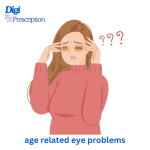
Some changes, like needing reading glasses, are normal, while others may signal more serious conditions requiring medical attention. This guide explores the most common age-related eye problems, their symptoms, causes, and treatments, along with preventive measures to maintain eye health.
Common Age-Related Eye Problems
| Eye Problem | Symptoms | Causes | Treatment |
|---|---|---|---|
| Presbyopia (Difficulty Reading Up Close) | Blurry vision when reading small text | Loss of lens flexibility | Reading glasses, bifocals, LASIK |
| Cataracts (Cloudy Lens) | Blurred vision, glare sensitivity | Aging, UV exposure, diabetes | Surgery to replace the cloudy lens |
| Glaucoma (Optic Nerve Damage) | Peripheral vision loss, eye pain (in some cases) | Increased eye pressure | Eye drops, laser treatment, surgery |
| Age-Related Macular Degeneration (AMD) | Blurred central vision, dark spots | Retinal damage | Anti-VEGF injections, lifestyle changes |
| Diabetic Retinopathy | Floating spots, blurry vision | High blood sugar damaging blood vessels | Laser therapy, medication, blood sugar control |
| Dry Eye Syndrome | Red, itchy, irritated eyes | Reduced tear production with age | Artificial tears, lifestyle changes, omega-3 supplements |
| Floaters & Flashes | Small dark specks in vision | Vitreous gel changes with age | Usually harmless, but sudden increase needs medical attention |
Symptoms of Age-Related Eye Problems
????️ Blurry vision when reading or driving
???? Increased sensitivity to light and glare
???? Dry, itchy, or watery eyes
???? Sudden appearance of floaters or flashes
???? Gradual loss of peripheral or central vision
If you notice any of these symptoms, consult an eye specialist (ophthalmologist) for an eye exam.
Preventive Measures to Maintain Eye Health
✅ Regular Eye Exams – Get an eye checkup at least once a year after 40.
???? Healthy Diet – Eat leafy greens, carrots, and omega-3-rich fish for eye health.
???? Protect from UV Rays – Wear sunglasses to prevent cataracts and macular degeneration.
???? Quit Smoking – Smoking increases the risk of glaucoma and AMD.
???? Stay Hydrated – Drink enough water to reduce dry eyes.
???? Limit Screen Time – Follow the 20-20-20 rule (look away every 20 minutes for 20 seconds at something 20 feet away).
Conclusion
Age-related eye problems are common, but early detection and lifestyle adjustments can help preserve vision. Regular eye checkups, a nutritious diet, and protective habits can significantly reduce the risk of serious eye diseases.
References:
-
American Academy of Ophthalmology (AAO) – Age-Related Eye Diseases – https://www.aao.org
-
National Eye Institute (NEI) – Protecting Vision as You Age – https://www.nei.nih.gov
-
Mayo Clinic – Common Eye Disorders and Prevention – https://www.mayoclinic.org
